'Comedians are storm chasers': Making Sense of Christian Jegard
He's a bamboozling performer and a thoughtful, easy-going gent. Dubbed the neurodivergent lovechild of Les Dawson and Tommy Cooper, as featured on BBC Three and Radio 4 Extra.
He left me thinking, “Who is this man?” It was like meeting the Count of Monte Cristo. I’d seen him perform a short set in London’s West End, at the Phoenix Arts Club as part of an event for . He brought a slick mix of stand-up and musical comedy, but everything about it was odd.
Christian’s approach is not easily defined, but the Vic and Bob1 influences were obvious to me, with their absurd antics and Morecambe and Wise-style show tunes. Though he’s far from a rip-off, many of his lines would never come from such a double act, and he’s created something that feels newly formed.
You’ll rarely hear a comic speak at such a leisurely pace, like a jazz crooner or a beat poet, with gargantuan pauses in between lines — an enviable cool. Part of his persona is to pair this confidence with hints that his life is falling apart.
He also jokes about his autism, but with surreal twists: “A lot of people think that we can bite through metal”. That’s before discussing the common misconceptions around copper wiring: “Take everything you know about copper wiring and discard it from your mind.” …What? Exactly, meet Christian Jegard.
The Interview
Can you introduce yourself?
Yes, I’m a comedian, full stop. A writer, full stop. And an actor, question mark?
Can you tell me about a challenge you’ve had in your comedy career?
Yes, well, I had to overcome not being funny at first.
I was funny in certain ways, but I had no structure. So, with encouragement from my wife, I took a comedy course in Brighton, because I wasn’t sure how to approach stand-up. There’s nothing worse for a comedy career than not being funny. I’m now often funny, or sometimes funny.
I also overcame nerves. Man, in the beginning, I felt like I was going to pass out, but now I really enjoy it.
You must have overcome those nerves, because you take these big pauses between jokes. Many would be afraid to do that.
I’m not nervous at all now! I’ve realised that just this second. I’ve been gigging a lot these past few weeks, and I’m getting comfortable.
Jerry Seinfeld said that “faking confidence is confidence”, which I did initially, but I rushed through my sets.
“My material tends to work best when a bit drawn out. I love the pauses, the stilted delivery, and holding people’s gaze.”
I saw Norm Macdonald doing it on Saturday Night Live.
Sometimes he’d tell a funny joke, but the audience wouldn’t laugh if he were getting a complicated idea across. He’d stare intensely at them until they started laughing. Some laugh out of awkwardness, admittedly, but it also allows for your ideas to sink in.
I was given some great advice: walk slowly to the microphone. If you rush to the microphone, you appear nervous, and the audience can’t relax.
How different are you on and off stage?
I try hard to be myself. My act on stage is similar to me offstage, but I can’t be the same person up there, because it’s not normal to be speaking to a captive audience.
I’m not a great judge of character, so I can lose the audience with new material, though I’ve got better at figuring out what audiences like in the writing stage.
How do you write punchlines that have a ring to them? Do you use the skills you’ve learnt from writing lyrics, such as repeating vowel sounds?
Comedy has a beat, just like music. You get a feel for that rhythm. It’s about tension, timing and when you release it. And the conditions have to be just right.
It’s like watching a horror film at home in the middle of the day, as opposed to in the cinema. It’s nowhere near as terrifying because you can pause it and chat. You’ve killed the conditions.
“Comedy is very conditional; comedians are like storm chasers. They’re always chasing funny, trying to get the conditions just right.”
John Cleese said that comedy is very brittle. If something is wrong in the room, it can kill it stone dead.
In terms of the beats, the audio commentary for the sitcom I’m Alan Partridge has Steve Coogan, Armando Iannucci and Peter Baynham talking about that famous scene where Alan is pitching titles for TV shows: Inner City Sumo, A Partridge Amongst the Pigeons, etc.
In the commentary, they said the plan was always to end with a two-word idea, with four syllables, which, of course, was “Monkey Tennis”. They said it needed to be short.
“But the point of comedy is to hide the work behind it.”
It only sells if it feels loose and effortless. It only works if it seems like you’ve come up with it off the top of your head. That’s why stand-up scenes in films are rarely funny, i.e. Punchline with Tom Hanks, Funny People with Adam Sandler, etc. We know it’s scripted, so it doesn’t feel spontaneous. Plus, the laughs are usually dubbed in.
When we watch a magician, we know they haven’t sawed a person in half, but it’s about creating the conditions under which it feels like they have.
Another example is the stand-up routines at the start of every Seinfeld episode. I love the show and find Jerry’s stand-up funny, but the music messes with the vibe. The spontaneity and the silences are gone.
I’m a fan too, but I think Seinfeld could have done without the slap bass. I think it was just a weird early-nineties choice. The early nineties were a weird time for aesthetics. I find the slap bass and his jeans and sneaker combos very distracting.
Have you ever related to a fictional character?
Yeah, all the time, because I suppose they’re written so that we relate to them. But…
“I watched this film, Every Which Way but Loose, where Clint Eastwood goes around America bareknuckle boxing with an orangutan, and I super related to that orangutan. He seemed very at ease with everything, and there were lots of punch-ups happening around him.”
Ha-ha, that’s how you came across when I chatted to you after your performance in London. You’ve sort of got the personality of a jazz musician.
Nice! I’ll take that.
You’ve got a sort of smooth voice.
I like all the old singers like Frank Sinatra and Dean Martin…
“People refer to my act as a character, and it’s sort of a character, but not really. It’s me 10 years ago.”
I lived in a horrible, bug-infested bedsit, and I was on benefits for a couple of years, constantly getting and losing jobs. So, I’m playing a man who’s not in a good situation.
However, because I’m also quite a private person, I’m influenced by Harry Hill, Vic and Bob, Tommy Cooper and Les Dawson. They used their real names, and they’re a bloke on stage, but they’re, in parentheses, “A bloke on stage”, y’know what I mean? The audience knows them, but they don’t really know them.
When I started, I felt very uncomfortable wearing my regular clothes, so I started wearing my suits. And I loved comedy but didn’t know what to joke about…
“I used to be a lounge singer, singing Dean Martin songs in a bar, so my wife suggested I bring music into the equation.”
Comedians used to be quite anonymous on stage. The old comics and vaudeville performers weren’t there to tell you about their lives, but then comedy changed. It happened in the 60s for Americans, with brilliant comedians like Richard Pryor, George Carlin and Lenny Bruce. And it happened in Britain in the 80s, with what we now call the rise of “alternative comedy”.
That’s great, but I’m influenced more by the old way. Stewart Lee once said there used to be a blackboard in the green rooms at comedy clubs, with a list of famous club jokes, so that comedians would know which ones not to do… There’d been this culture of comedians doing each other’s material.
However, they’d infuse these boring old jokes with their personality, style… and unique interpretation and delivery. Tommy Cooper was doing old Groucho Marx jokes, for example. They’d almost be with the audience against the joke, taking a ropey old joke and performing it in a new way.
Well, I’m not telling old jokes, but I’m telling completely ridiculous jokes with the same old-timey showbusiness sheen. They’d tell jokes that make you groan, but sarcastically do it with the jazz hands of show business.
“There’s something in that idea of a beleaguered comedian having to turn on the charisma when it’s showtime, like Krusty the clown groaning before the cameras start rolling in The Simpsons.”
I find that funny, so I let on that all is not well, as it wasn’t 10 years ago, but my mannerisms and songs are in the crooning, show business style, like everything’s fine and dandy.
So you’re satirising the straight-laced way comedy used to be?
Here’s what it is: I like to write about my interests… but I’m not hugely interested in myself. I like idea-based comedy, which isn’t necessarily confessional. It means I have a fun act that I enjoy performing, and that’s comfortable for me, but the downside is that sometimes I have trouble connecting with an audience.
“There’s an inherent detachment as part of my on-stage persona.”
I think there’s a difficulty with talking about oneself when you’re autistic, because I feel there’s always more I could add. There’s always more to say.
I think that’s part of the perfectionism of autism. I also have Obsessive-Compulsive Disorder (although I’m managing it quite well at the moment). So, I obsess over things. It’s been great for comedy because I had an encyclopedic knowledge of it from an early age. But it can lead a comedian to over-egg the pudding in the writing stage.
Sometimes I can’t leave a joke alone and scramble it by going through four or five drafts over what I should have done. That’s less of a problem with my stand-up nowadays, but I do endless takes when filming something. I’ll look back on the footage afterwards, and my wife will say, ‘You know, if you get hired for a role, you can’t do endless takes. There isn’t time.’
“Comedy requires that obsessive brain to a degree, because you need to consider every avenue to pick the funniest one.”
Are you developing a debut hour?
I am, I’ve done it five times as a work-in-progress, and I’m hoping to debut it at the Edinburgh Fringe next year. I do mind reading, magic, and ventriloquism.
“I don’t think you saw the dummy, he’s pretty terrifying.”
Oh, and I’ve now got a dance routine with a cane, as I’ve been watching a lot of Morecambe and Wise — very much your music hall/vaudeville type of stuff. There’s tap dancing, and I’m very pleased with it.
“The thread throughout the show is this idea that his wife has left him, and he’s claiming to be over it, when he clearly isn’t.”
I don’t even know why I’m asking this. How do you feel about raffles and tombolas? 2
Aggressively ambivalent.
Ha-ha!
I don’t like them because I never win anything. My wife wins all the time! Even as a kid, I never got any prizes from either… I like the action of tombolas. I just want to clarify that I’m not here to slag off tombolas, I don’t want the tombola people breathing down my neck. I like them, I’d just like to win something.
Were the Beatles right that all you need is love?
More or less, yeah. And a comprehensive defence system.
I don’t think I’ll ever forget laughing with my brother watching Christian’s performance. It was fab to catch up with him, and I hope you’ve enjoyed reading his thoughts. You should follow him on Instagram so you never miss his next move.
If you comment, it makes me happy. The likes do too.
Vic Reeves and Bob Mortimer are known primarily in the UK for their sitcoms and the absurd quiz show Shooting Stars.
A tombola is a type of lottery game played in the UK, and some parts of Europe and Asia. Numbers are drawn from a rolling tombola drum, with a handle to turn.

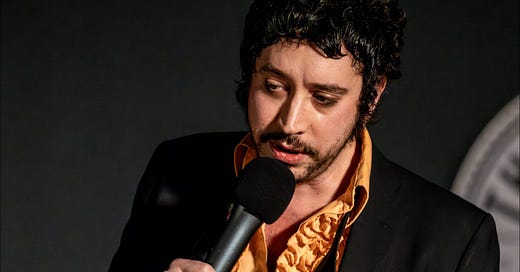



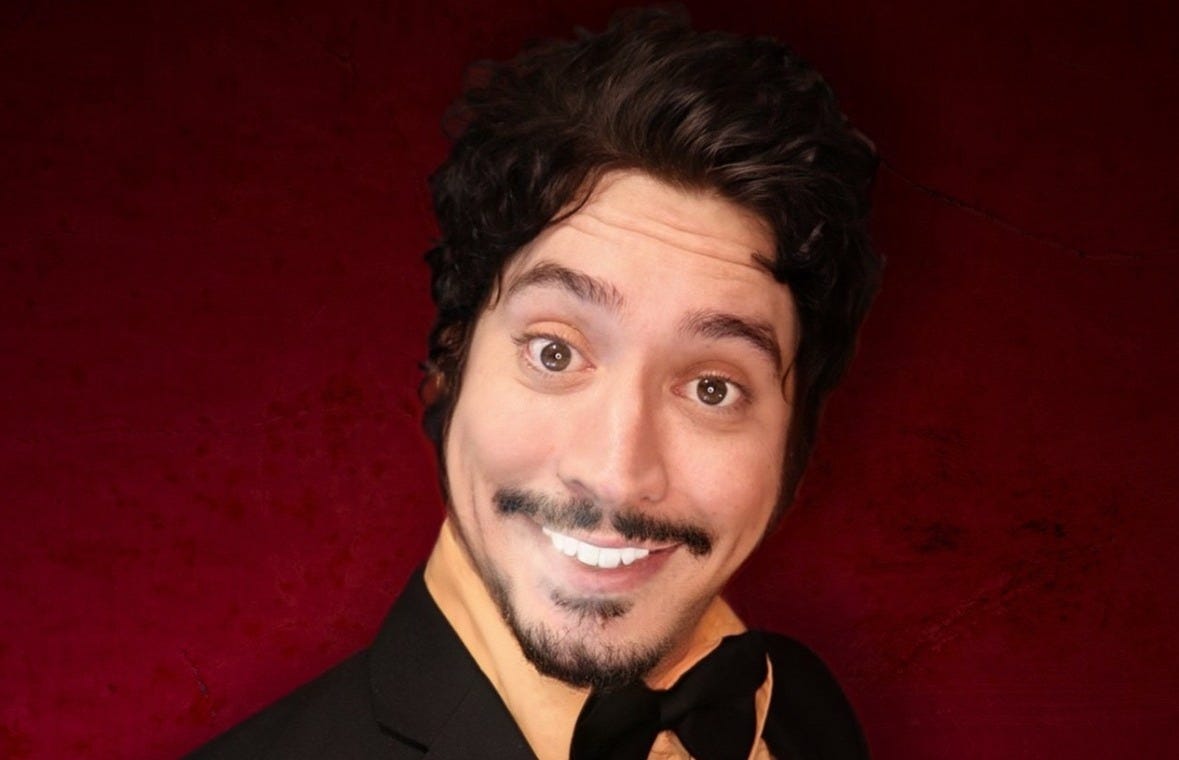
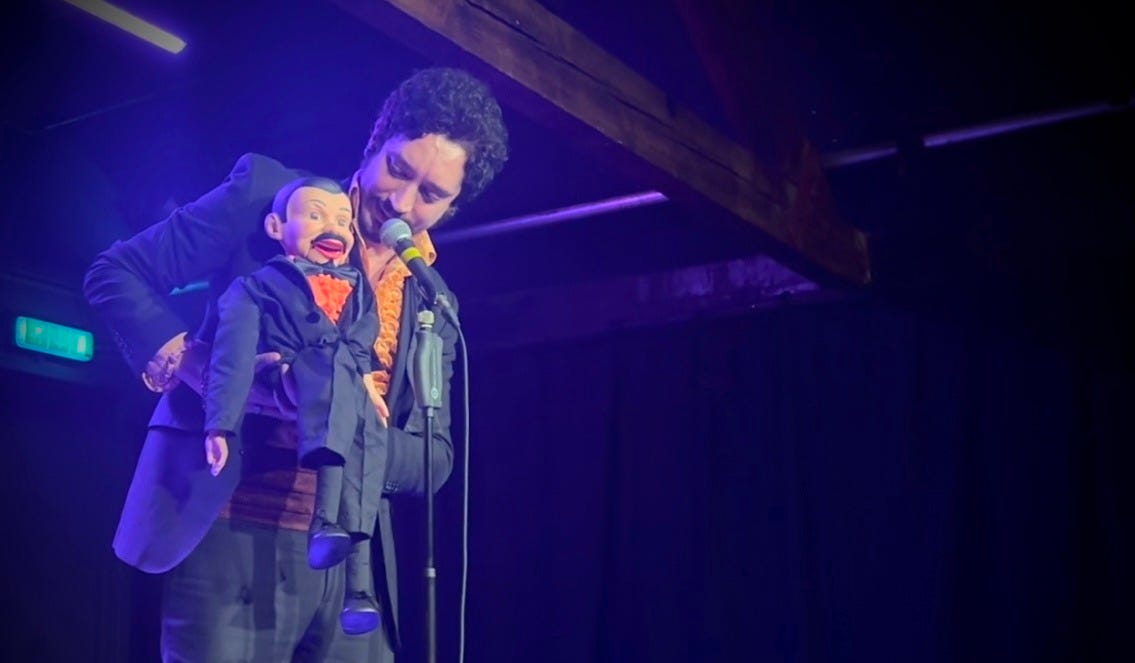
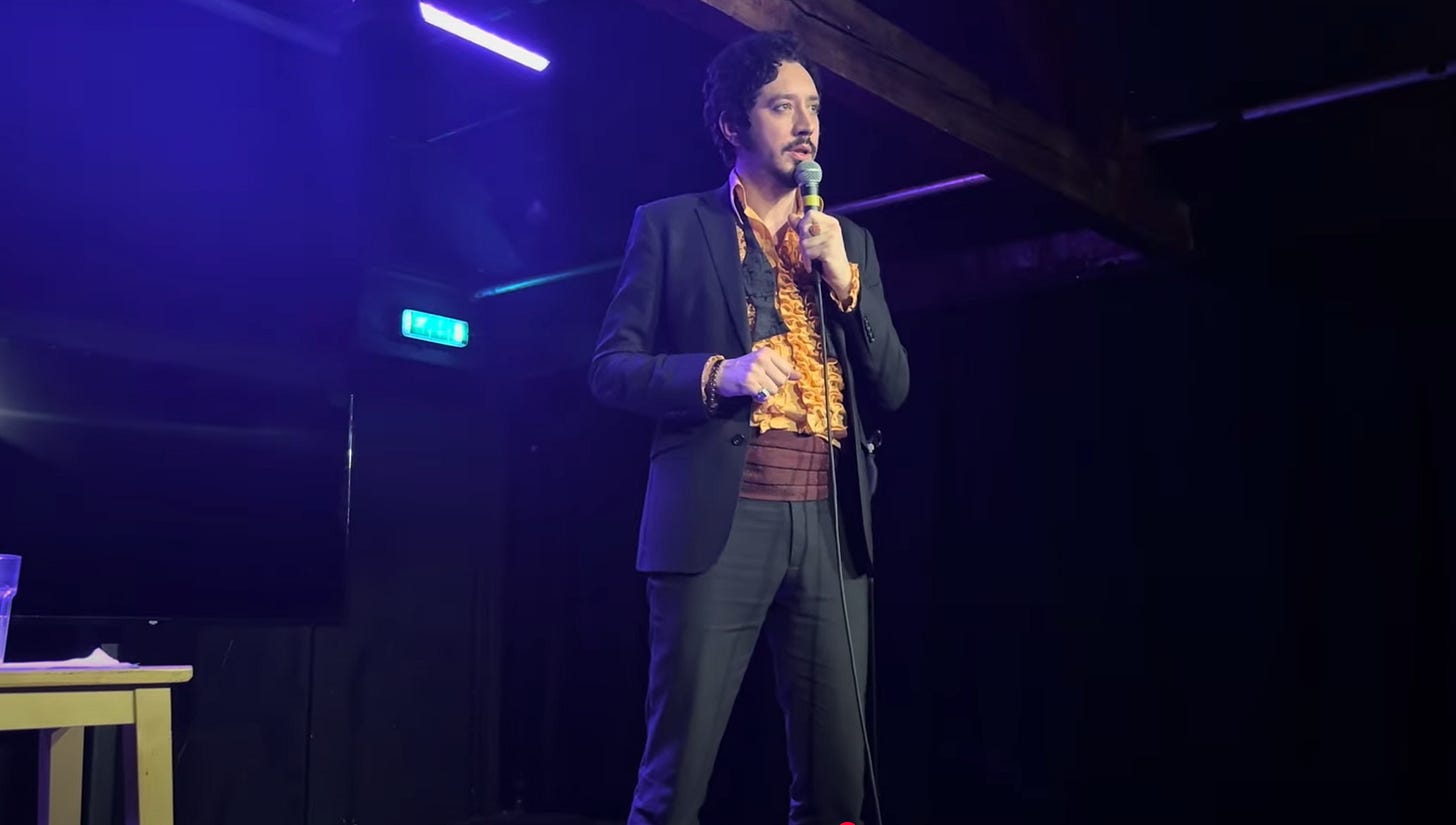
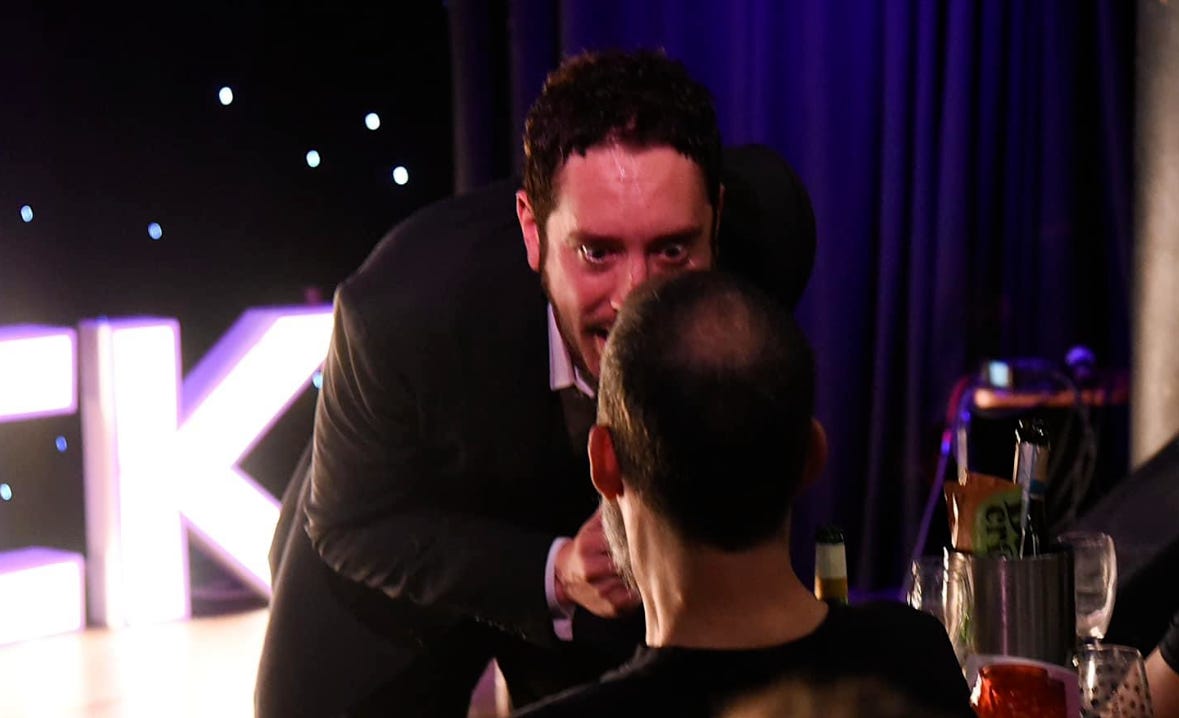
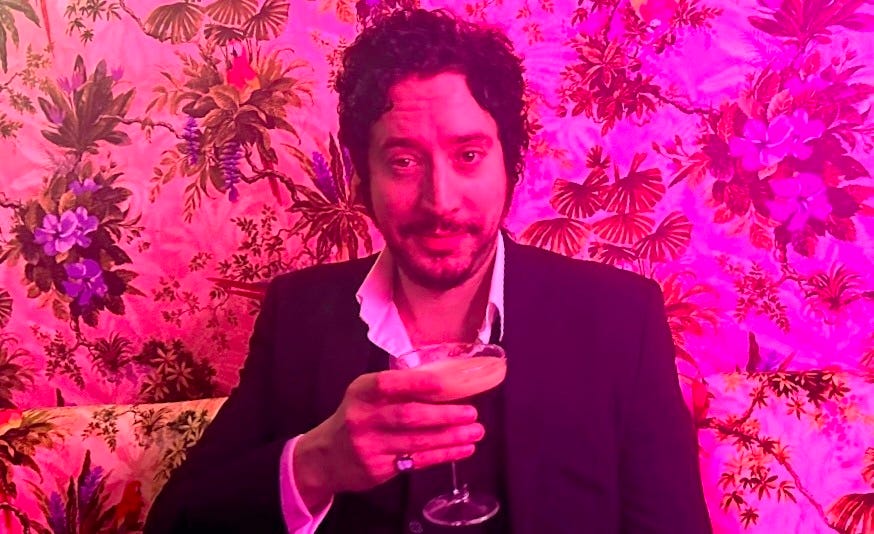
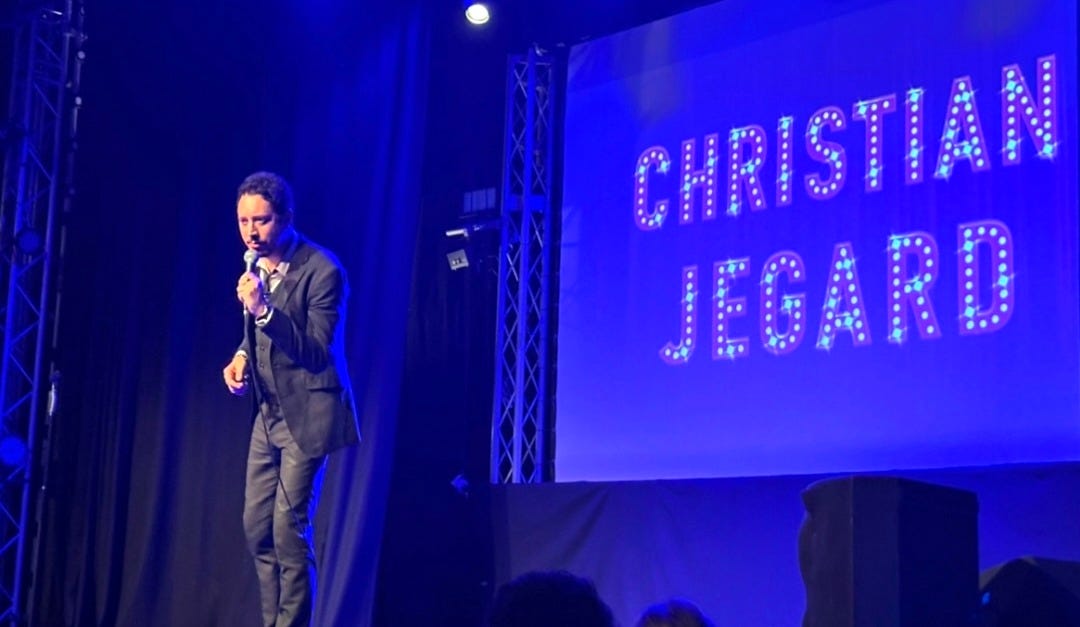
Fabulous Dan, as always! x
Thank you for the share, Howard!